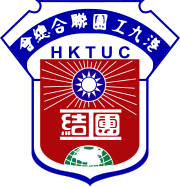This article has multiple issues. Please help improve it or discuss these issues on the talk page . (Learn how and when to remove these messages)
|
Hong Kong and Kowloon Trades Union Council 港九工團聯合總會 | |
|---|---|
 | |
| Chairman | Lee Kwok-keung |
| Founded | September 1948 |
| Headquarters | Room 20, 4th floor, Yick Fat Building, 1048 King's Road, Quarry Bay, Hong Kong Island |
| Membership (2019) | |
| Ideology | |
| Political position | Centre-right to right-wing |
| Regional affiliation | Pro-Kuomintang camp |
| Colours | Blue |
| Legislative Council | 0 / 90 |
| District Councils | 0 / 470 |
The Hong Kong and Kowloon Trades Union Council is the third largest trade union federation in Hong Kong, after the Federation of Trade Unions (FTU) and pro-Beijing Federation of Hong Kong and Kowloon Labour Unions (FLU). It is affiliated with the International Trade Union Confederation.
Contents
HKTUC has been pro-Kuomintang, one of the main political parties of the Republic of China, since its establishment in 1948 and has maintained a close relationship with the party. [1] It was the biggest rival to the leftist trade unions FTU and was seen as a rightist union. The former leader of the union, Pang Chun-hoi was the Legislative Council member for the Labour constituency from 1985 to 1995, while another seat of the two was occupied by the FTU leader Tam Yiu-chung before the handover of Hong Kong in 1997.